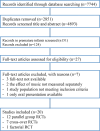Do Hospitalized Premature Infants Benefit from Music Interventions? A Systematic Review of Randomized Controlled Trials
- PMID: 27606900
- PMCID: PMC5015899
- DOI: 10.1371/journal.pone.0161848
Do Hospitalized Premature Infants Benefit from Music Interventions? A Systematic Review of Randomized Controlled Trials
Abstract
Objective: Neonatal intensive care units (NICU) around the world increasingly use music interventions. The most recent systematic review of randomized controlled trials (RCT) dates from 2009. Since then, 15 new RCTs have been published. We provide an updated systematic review on the possible benefits of music interventions on premature infants' well-being.
Methods: We searched 13 electronic databases and 12 journals from their first available date until August 2016. Included were all RCTs published in English with at least 10 participants per group, including infants born prematurely and admitted to the NICU. Interventions were either recorded music interventions or live music therapy interventions. All control conditions were accepted as long as the effects of the music intervention could be analysed separately. A meta-analysis was not possible due to incompleteness and heterogeneity of the data.
Results: After removal of duplicates the searches retrieved 4893 citations, 20 of which fulfilled the inclusion/exclusion criteria. The 20 included studies encompassed 1128 participants receiving recorded or live music interventions in the NICU between 24 and 40 weeks gestational age. Twenty-six different outcomes were reported which we classified into three categories: physiological parameters; growth and feeding; behavioural state, relaxation outcomes and pain. Live music interventions were shown to improve sleep in three out of the four studies and heart rate in two out of the four studies. Recorded music improved heart rate in two out of six studies. Better feeding and sucking outcomes were reported in one study using live music and in two studies using recorded music.
Conclusions: Although music interventions show promising results in some studies, the variation in quality of the studies, age groups, outcome measures and timing of the interventions across the studies makes it difficult to draw strong conclusions on the effects of music in premature infants.
Conflict of interest statement
The authors have declared that no competing interests exist.
Figures
References
Publication types
MeSH terms
LinkOut - more resources
Full Text Sources
Other Literature Sources
Medical



